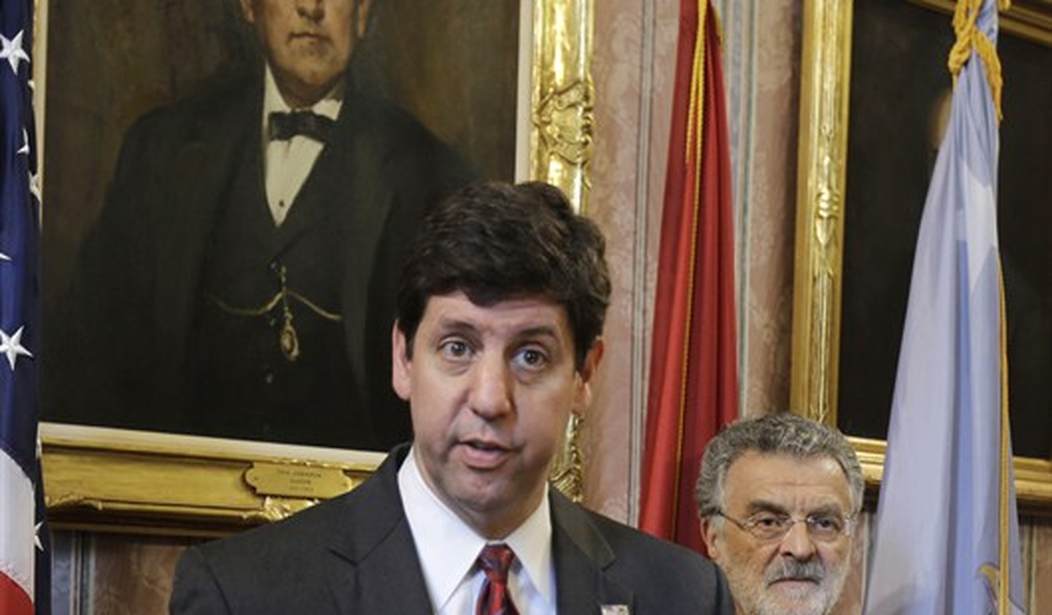Steve Dettelbach’s nomination as permanent director of the Bureau of Alcohol, Tobacco, Firearms, and Explosives limped across the finish line on Tuesday as the president’s second choice for the job won approval in the Senate on a 48-46 vote. Two Republicans, Rob Portman of Ohio and Susan Collins of Maine, ended up voting for Dettelbach, giving him a slim majority and giving gun control activists their biggest win of the Biden presidency.
Yes Dettelbach was Joe Biden’s second choice, with gun control activist David Chipman’s nomination flaming out in spectacular fashion after Democrats Angus King and Joe Manchin declared they couldn’t vote for him. Dettelbach doesn’t have Chipman’s history of working as a gun control lobbyist, but the two men share the same anti-gun ideology. Dettelbach himself received the endorsement of Everytown for Gun Safety when he unsuccessfully ran for Attorney General in Ohio in 2018, and he’s expressed his support for a ban on so-called assault weapons as well as “universal background checks.”
Now the gun control lobby has one of their own in charge of the agency that enforces our nation’s gun laws and regulations, and as you can imagine, they’re thrilled.
JUST IN: The Senate has confirmed Steve Dettelbach as @ATFHQ Director! After seven years without a Senate-confirmed director, the ATF now has a strong leader who can ensure the agency does its job to enforce our gun laws and hold bad actors in the industry accountable. pic.twitter.com/lJWaxdjOnD
— Everytown (@Everytown) July 12, 2022
Of course, the gun control lobby thinks the firearms industry itself is a “bad actor,” and one of the first things we’re likely to see with Dettelbach installed as the ATF’s top dog is a much more adversarial relationship between the ATF and the industry. The left lost its collective mind earlier this year when it was revealed that then-acting director Marvin Richardson had attended SHOT Show and actually sat down for discussions with the National Shooting Sports Foundation. There was nothing new or nefarious about that, but anti-gun activists portrayed the professional relationship as a sign that the ATF and the firearms industry have become too cozy. With Dettelbach now in place, the gun control lobby expects the ATF to treat the firearms industry in an outright hostile fashion.
So far the NSSF hasn’t officially weighed in Dettelbach’s confirmation, but senior vice president and general counsel Larry Keane did share a story on Twitter on Tuesday afternoon raising doubts about the impending ATF rules on unfinished frames and receivers as well as pistol stabilizing braces.
Why a Supreme Court EPA Ruling Could Doom Recent ATF Rules @lkeane #ATF #EPA #SCOTUS https://t.co/iL8o1nXddq
— NSSF—The Firearm Industry Trade Association (@NSSF) July 12, 2022
In the piece, Keane suggests that, thanks to the Supreme Court’s ruling in West Virginia v. EPA, the agency could find it difficult if not legally impossible to enforce the new rules, even with someone as hostile to the Second Amendment as Steve Dettelbach in charge at the ATF.
The decision to limit the EPA’s authority to promulgate rules over “cap-and-trade” schemes doesn’t seem like a direct translation to the Department of Justice (DOJ) and ATF until it’s looked at through the lens of executive agencies claiming legislative authority where it does not exist. The DOJ and ATF claimed authority to rewrite the rules defining what is a frame and receiver and define AR-pistols as short-barreled rifles under the 1968 Gun Control Act and the 1934 National Firearms Act. In both laws, however, the authority for ATF to do so doesn’t exist. In fact, defining firearms is explicitly the authority of Congress.
Congress set the definition of what constitutes a firearm in the 1968 Gun Control Act. In the case of reclassifying AR-pistols as short-barreled rifles, these definitions were created by Congress. Congress alone has the authority to rewrite them. Neither of the laws include provisions allowing agencies, including the ATF or the Attorney General, to rewrite definitions of what constitutes a firearm on their own.
The DOJ, through the ATF, appears to be overstepping their congressional authority to redefine frames and receivers differently from how Congress defined the terms in statute. Similarly, the agencies are attempting to redefine what is classified as short-barreled rifles and subject them to the NFA regulations, including taxes, photo and fingerprint submission and onerous background checks. The role of the ATF and DOJ is to enforce the 1934 NFA and 1968 Gun Control Act. DOJ and ATF have the congressionally delegated authority to faithfully implement those laws through rulemaking. But that delegated authority doesn’t authorize them to change the law on their own to match advancements in technology or their view of good public policy.
The major question with the DOJ’s proposed rules is where do they derive Congressional authority to assert this power? The rules, in light of the W.V. v. EPA ruling, appear to be out of bounds. The Supreme Court’s decision is a welcome – and necessary – check on the growth of the undemocratic “administrative state.”
The ATF’s new rules are already facing legal challenges ahead of their enforcement dates (late August for the rule regarding frames and receivers and September for the pistol brace rule), but as Keane points out, the Supreme Court’s decision in both Bruen and West Virginia v. EPA cast serious doubt on the ATF’s authority to impose these new restrictions in the first place. The gun control lobby is undoubtably expecting big things from Steve Dettelbach, and I’m sure he’ll do his best to live up to their expectations, but the courts could (and should) reign in the agency’s abuse of power before the gun control lobby is able to fully weaponize the ATF against the firearms industry and individual gun owners.









Join the conversation as a VIP Member